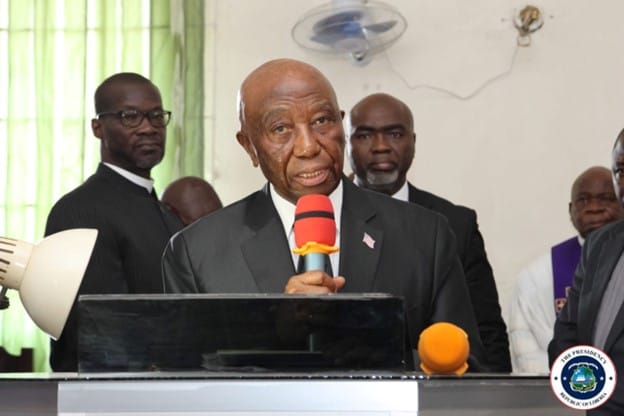Liberia: Pres. Boakai Reaffirms Administration's Commitment to Fiscal Discipline in National Budget Execution, Calls for Swift Legislative Approval - FrontPageAfrica

Source: Front Page Africa
Author: Gerald C. Koinyeneh
CAPITOL HILL, Monrovia - President Joseph Nyuma Boakai said in order to execute the National Budget successfully, fiscal discipline should be the hallmark in the process.
By Gerald C. Koinyeneh - [email protected]
In a communication submitting the draft national budget for fiscal year 2024, President Boakai said the successful execution of this Budget in a credible fashion will require that the government takes certain deliberate actions collectively.
"Firstly, fiscal discipline must be our guiding principle for budget execution. The Amended and Restated PFM Act, the PFM Regulations, and the Fiscal Rules must be adhered to by all at all times. Secondly, heads of spending entities must exercise their fiduciary responsibility to ensure the highest degree of fiscal probity and accountability as the Budget Holders," the President said.
President Boakai had campaigned on the promise to take drastic measures aimed at curbing corruption and raising the living standard of his fellow Liberians. Although Liberia's Public Financial Management Law calls for spending entities to make periodic reports to facilitate routine audits, this clause has been ignored over the years with the Legislature consistently approving national budgets without obtaining periodic reports from spending entities.
The president said it was now time to stop this practice and "restore this missing link."
"We must be reminded about the requirements of the PFM Law that spending entities make periodic reports to facilitate routine audits. Adherence to these requirements has been the missing link in our budget execution and must be restored. I urge heads of spending entities to lend their fullest cooperation as we endeavor to depart from business as usual to pursue a path of transparency and accountability in public financial management."
The passage of the national budget has experienced an unprecedented delay. This is due to the House of Representatives' decision to send back the draft budget for fiscal year 2024 presented to the Legislature by Boakai's predecessor George Weah before his exit from office.
In his communication, President Boakai emphasized that his government has missed nearly the entire first quarter of the fiscal year of full budget execution. He said this delay has caused disruption in the implementation of programs and projects earmarked by his administration.
"The delayed commencement of fully executing the budget and the approaching rainy season have traditionally adversely affected the timing and implementation of programs and projects. It is against this background that I implore your indulgence to expeditiously enact the draft FY2024 Budget into law for its full execution," he urged.
Budget Summary
The proposed resource envelope for the FY2024 budget as submitted by the President is projected at US$692.4 million, of which tax revenue accounts for US$540.2 million or 78 percent and Non-tax Revenue of US$109.8 million or 16 percent. Externally sourced revenue is projected at US$42.4 million or 6 percent of the revenue estimate Compared to the FY2023 budget outturn of US$793.3 million.
In his submission, the President said the FY2024 budget represents a decrease of 12.7 percent, which he attributed to a decrease of US$144.6 million in external financing. The President noted that in order to manage the debt portfolio which crowds out spending on critical priorities, his Government has decided to exercise fiscal restraint and discipline when it comes to acquiring new debts. This decrease, he revealed, will be offset by increases in Tax Revenue of US$16.7 million or 3% and Non-Tax Revenue of US$27.0 million or 33%.
Medium-Term Horizon
The President announced that the medium-term projections for domestic revenue for the outer years 2025 and 2026 are set at US$675.5 million and US$712.1 million, respectively. Of these amounts, he said 2025 tax revenues are estimated at US$560.3 million (83 percent) and nontax US$115.2 million (17 percent). In 2026, tax revenue will rise to US$591.2 (83 percent) and nontax US$121.0 million (17 percent), he said.
Proposed Expenditure Priorities
The proposed expenditure for FY2024 is shared between recurrent expenditure of $640.5 million or 93 percent and public sector investment projects (PSIP) is US$51.9 million or 7 percent. Among the key recurrent expenditures, the President outlined, are debt services to commercial banks arising from construction projects and to multilateral institutions in order to unlock support to medium-term development priorities. Other recurrent expenditures are compensation of employees, operational goods and services for government entities and subsidies, grants and transfers to governmental and non-governmental institutions in the health and education and social service sectors.
Recurrent Expenditure
The government allocated the proposed recurrent expenditure of US$640.5 million towards major expenditure categories including debt service (domestic and foreign) US$129 million, compensation of employees US$297 million, use of goods and services US$90.2 million (including US$4.7 million for drugs and medical consumables), acquisition of non-financial assets US$3 million, social benefits (pensions, retirement benefits, etc.) US$17.9 million, subsidies US$1.7 million and grants US$101.7 million.
Public Sector Investment Projects
The President acknowledged that the national budget is the framework for planning and executing short, medium and long-term public sector investments that will reduce the infrastructure and other capacity gaps that constrains growth and development. However, he said given the limited time to design and formulate projects through the regular sector working group for inclusion in the budget, ongoing public sector investment projects that are aligned with the ARREST Agenda have been prioritized such that allocations for those projects are ring-fenced to ensure their completion.
The government's proposed allocation for Public Sector Investment Projects is US$51.9 million, and of this amount, some "critical programs" that have been prioritized within the PSIP envelope include the allocation of US$26.3 million to Road Fund projects; US$13.9 million to 100-day Deliverables; US$3.6 million to District Development Projects; US$1.8 million to Youth ICT Capacity Building; and US$1.5 million for Asset Recovery Task Force.
The House then forwarded the President's communication to its Ways, Means, Finance Committee to report within two weeks.



